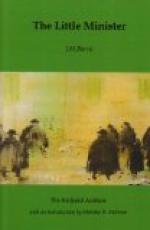“Follow me,” was all the panting grieve could say at first, but his agitation told half his story. They went with turn patiently, only stopping once, and then excitedly, for they come suddenly on Rob Dow. Rob was still lying a prisoner beneath the tree, and the grieve now remembered that he had fallen over this tree, and neither noticed the man under it nor been noticed by the man. Fifty hands released poor Dow, and two men were commissioned to bring him along slowly while the others hurried to the rescue of the earl. They were amazed to learn from the shepherd that Mr. Dishart also was in danger, and after” Is there a woman wi’ him?” some cried,” He’ll get off cheap wi’ drowning,” and “It’s the judgment o’ God.”
The island on which the two men stood was now little bigger than the round tables common in Thrums, and its centre was some feet farther from the bank than when Gavin jumped. A woman, looking down at it, sickened, and would have toppled into the water, had not John Spens clutched her. Others were so stricken with awe that they forgot they had hands.
Peter Tosh, the elder, cast a rope many times, but it would not carry. The one end was then weighted with a heavy stone, and the other tied round the waists of two men. But the force of the river had been underestimated. The stone fell short into the torrent, which rushed off with it so furiously that the men were flung upon their faces and trailed to the verge of the precipice. A score of persons sprang to their rescue, and the rope snapped. There was only one other rope, and its fate was not dissimilar. This time the stone fell into the water beyond the island, and immediately rushed down stream. Gavin seized the rope, but it pressed against his body, and would have pushed him off his feet had not Tosh cut it. The trunk of the tree that had fallen on Rob Dow was next dragged to the bank and an endeavor made to form a sloping bridge of it. The island, however, was now soft and unstable, and, though the trunk was successfully lowered, it only knocked lumps off the island, and finally it had to be let go, as the weavers could not pull it back. It splashed into the water, and was at once whirled out of sight. Some of the party on the bank began hastily to improvise a rope of cravats and the tags of the ropes still left, but the mass stood helpless and hopeless.
“You may wonder that we could have stood still, waiting to see the last o’ them,” Birse, the post, has said to me in the school-house, “but, dominie, I couldna hae moved, magre my neck. I’m a hale man, but if this minute we was to hear the voice o’ the Almighty saying solemnly, ’Afore the clock strikes again, Birse, the post, will fall down dead of heart disease,’ what do you think you would do? I’ll tell you. You would stand whaur you are, and stare, tongue-tied, at me till I dropped. How do I ken? By the teaching o’ that nicht. Ay, but there’s a mair important thing I dinna ken, and that is whether I would be palsied wi’ fear like the earl, or face death with the calmness o’ the minister.”




